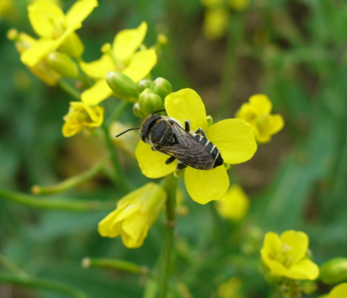Consequences of pollinator availability and effectiveness for pollen transfer in a gynodioecious seed crop system
DOI:
https://doi.org/10.26786/1920-7603(2022)680Keywords:
Apis mellifera, Brassica napus, hybrid seed canola, oilseed rape, Megachile rotundata, pollen depositionAbstract
Pollinator availability and effectiveness are important considerations in plant systems that depend on insect transfer of pollen. In mixed-flower systems (such as dioecious or gynodioecious systems), pollinators may distinguish between morphs, a behaviour which could have negative implications if it leads to reduced cross-pollination. We examined pollinator visitation, response, and effectiveness in hybrid canola seed production, a gynodioecious crop, to understand how pollinator behaviour contributes to cross-pollination between ‘male’ (hermaphroditic) and ‘female’ (male-sterile) morphs. The pollinator types found in these fields differ in visitation rate, size, and pollen load, factors that may affect pollen transfer between plants. The willingness of pollinators to move between male and female flowers can also affect pollen deposition. We used an interview bouquet to present unvisited female inflorescences to different pollinator types visiting male and female flowers to understand behavioural responses to floral morphs and the factors that contribute to better pollination effectiveness. Managed pollinators (honey and leafcutter bees) were far more abundant than wild pollinators in this system. Bees foraging on male flowers were less likely to accept a proffered female flower than those foraging on female flowers. Pollen deposition on stigmas was influenced by pollinator type (female leafcutter bees were the most effective) and increased with time spent on a flower. Pollinators transferring from a male flower to a female flower deposited more pollen than those that originated on female flowers, emphasizing the importance of transfer between male and female morphs. Surprisingly, pollinators carrying more pollen transferred less pollen to recipient stigmas.

Downloads
Additional Files
Published
How to Cite
Issue
Section
License
Copyright (c) 2022 Riley Waytes, Dr. Ralph V. Cartar, Shelley Hoover

This work is licensed under a Creative Commons Attribution 4.0 International License.











